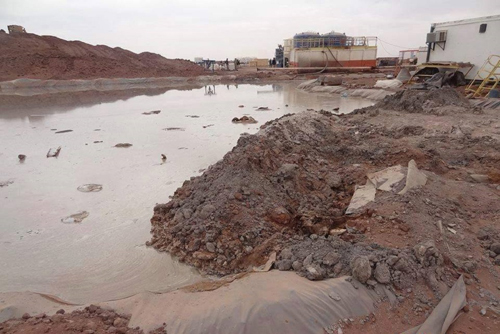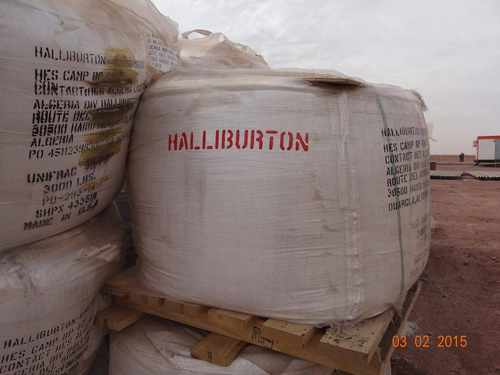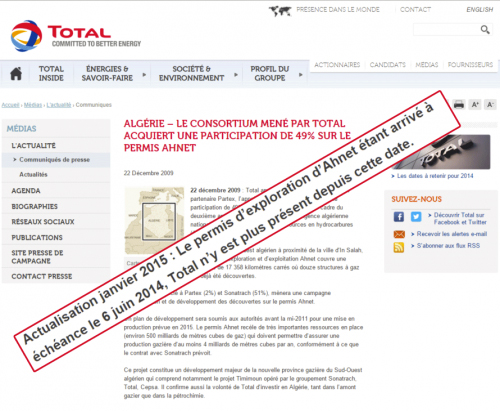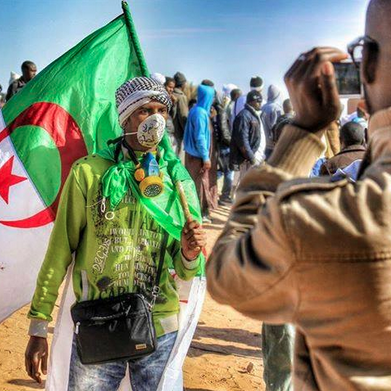In Algeria, unprecedented demonstrations calling for democracy and environmental justice have been targeting the Algerian government, the French giant Total, and several other multinational oil companies. A citizen movement against shale gas exploration has been rattling the country since December 31st 2014. The movement, which began near the drilling sites in Ain Salah, a town of 50,000 inhabitants deep in the Sahara, accuses the French oil multinational of hydraulic fracturing – or fracking – in their territory, even though it has been banned in France since 2011. It has spoken out against the irresponsibility of the public company Sonatrach and the Algerian government, which is burdening the region with serious pollution risks. Despite government attempts to quell the movement, it has continued to gather momentum. In March 2015, Basta! and the Multinationals Observatory published a report on Total and Algerian shale gas, which investigates the role of Total, as well as that of both Algeria and France, and highlights the issues at hand (read the report in French).

It all starts with the Algerian Ministers of Energy and the Environment and their visit on 27 December 2014, to the Ahnet basin, 1200 km south of Algiers, deep in southern Algeria. They had come to meet an audience of journalists and celebrate the "success" of the first pilot shale gas project conducted by the Algerian company Sonatrach. [1] A new hydrocarbons law enacted in 2013 now makes it legal to exploit shale gas in the country. The people of Ain Salah soon discovered the "first" drilling site, and learned about the project through the press. The next thing they knew, social networks cited that foreign companies including Halliburton, Schlumberger and Total were drilling at the site.
Duplicity and lack of transparency
Total indeed won a tender on the 22 December 2009 to acquire a 49% interest (the greater part going to the Algerian company Sonatrach) in the “Ahnet exploration and exploitation license”. Total hoped to begin drilling in 2015 and estimated the license would deliver the equivalent of 700 million barrels of oil. Negotiations with the Algerian government commenced in 2011. But just as alter-globalization organizations and ecologists in France were about to embark on a campaign demanding that Total withdraw from the concession and cease fracking, they found a surprise waiting for them. In late January 2015, as the Ain Salah protests spread to Algiers, Total suddenly announced that it would be no longer be partaking in the Ahnet concession. Why the sudden turn-around?
Total says that it was unable to reach an agreement on tax and trade conditions for the exploitation of the gas well. [2] Yet “the dates don’t add up,” an Algerian observer notes. A license was granted in late 2009 for a five-year period. It was not due to expire until late 2014, not in June, as stated by the multinational. Total was unwilling to clarify its statement when contacted by Basta! and the Multinationals Observatory.
Keeping fracking under wraps
In late February, as attempts to clamp down on the citizen movement intensified in Ain Salah, the Green MEP José Bové published an article that questions the French giant’s claims. “Just the fact that Total is considering drilling for shale gas in the desert illustrates once again that this company is reprehensible.” On the 2nd of March, Total denied its involvement on Twitter: “Total is neither producing nor drilling, and has not requested a license.”
The oil company maintains that it is no longer involved in exploring “shale gas” options in Algeria. But it says nothing about “tight gas”, another unconventional gas trapped in very compact rocks, the access to which also requires fracking. It is tight gas that is hidden in the Ahnet concession. If Total had got to the point of negotiating the commercial operating conditions with Algeria, exploratory drilling would have taken place. How else could have they estimated “probable” gas reserves under dunes to the west of Ain Salah? And even if it pulls out of Ahnet, the company is still the signatory of another tight gas concession agreement in Timimoun, in Western Algeria, (participating interest of 37.5% for Total, 51% for Sonatrach and 11.25% for Cepsa, a Spanish company) with plans to start production in 2017. Although the Total subsidiary in Algeria acknowledges its involvement, it is quick to evade the issue as soon as the question of the use of fracking comes up.[Read this article by Algérie Focus.]]
“Total is trying to gain time by playing with words,” says Hacina Zegzeg, involved in the movement in Ain Salah. “We are demanding a cessation of fracking.” Algerian activists see the government’s decision to open access to shale gas as a symbol of the influence of oil multinationals. The main objective of Sonatrach’s pilot drilling project seems to be proving that shale gas reserves exist in order to lure in foreign companies. This represents a way to ensure the exploration is invested in (and financed) by others – which is also a way to cover part of the costs … and the associated risks. [3]
Donate
Independent information on corporate power is critical, but is has a cost.
DonateWater “more sacred than oil”
The issue at hand is that fracking makes severe demands on Sahara’s scarce water resources. Dangers include intensive water use and pollution of groundwater and surface water – issues that are fuelling the citizen movement in Ain Salah. In this dry region, water pollution is “a question of life or death,” says Hocine Malti, a former Sonatrach executive. The population’s main source of income is derived from agriculture, which, without irrigation of palm groves, would suffer intensely.
The official request for a moratorium on shale gas, co-signed by Algerian experts and sent to President Abdelaziz Bouteflika on 21 February, highlights the environmental risks – water pollution, air pollution, earthquakes – as well as health risks. "The primary demand is that investments do not have any ramifications on water,” says Ghazi Hidouci, Algeria’s former minister of Economy and Finance (1989-1991). “The locals know that water is more sacred than oil”.
Lethal chemicals
Sonatrach pledges that it has mastered the fracking method. The company has been drilling for oil in Hassi Messaoud (North-East of Ain Salah) since 1956. Between 2006 and 2010, it allegedly drilled approximately 50 wells per year using fracking methods in this area. “Like other wells, these drilling sites have reached the water table without resulting in any negative impacts on the environment,” argues Said Sahnoun, Acting CEO of Sonatrach. The company also claims that it does not skimp on environmental protection measures. However, experience shows that there is still a significant proportion of defective wells, even in the U.S. Unconvinced by the Algerian authorities’ statements, the people of Ain Salah decided to visit the drilling site on February 3rd, 2015. Photos and videos posted on social network sites reveal the absence of facilities to treat water and drilling mud, leading the people of Ain Salah to blow the whistle on Sonatrach’s claims.

Activists also discovered the presence of chemicals such as Ezeflo110, which is used for fracking. These extremely hazardous substances were sitting on pallets when they should be stored securely. This was enough evidence to doubt Sonatrach’s ability to handle waste management and storage of lethal chemicals. A number of bags belonging to Halliburton were also proof that the company has been active on the site. Apparently the company provides technical support for hydraulic fracturing and is not directly involved as an operator.

Is the Algerian Sahara just France’s experimental playground?
The fears of Ain Salah’s residents are exacerbated by the fact that this is not the first time the region has been used for technological experiments. For the Saharan people, the pilot fracking project is a painful reminder of the terrible period of French nuclear testing in Reggane, southern Algeria in the 1960s. The local people still feel much resentment. “I gather that they are carrying out experiments,” says a resident of Ain Salah. “Like our co-citizens in Reggane, we are the stomping ground for French experiments.” “Up until now, the anniversary of the tests were met with absolute silence,” remarks Ghazi Hidouci. “This year there was an uproar. The Saharan people gave themselves a voice; they came out and expressed themselves. It turned political.”
Half a century later, tensions are running high at the idea of the former colonial power’s potential intervention in Algeria. A number of locals refer to the draft partnership agreement between the Algerian President and the French Minister of Foreign Affairs Laurent Fabius, which made a noise in the media in 2012. The agreement would make it possible for French firms to experiment with alternative techniques of hydraulic fracturing in Algeria. [14] "There is, to our knowledge, no such agreement," said a French diplomatic source. “Our bilateral dialogue with Algeria does not include any discussion of shale gas.” It would seem that the recent remarks of the Ambassador of France in Algiers on "strengthening the French-Algeria partnership", with reference to shale gas, were distorted. [4]
Police crack-down on the people of Ain Salah
The Algerian government has not responded to the moratorium request of the Ain Salah citizen movement submitted on 21 February, 2015. Leaders have issued contradictory statements, playing down the issue by declaring that it only concerns experimental pilot projects, soon to be completed, and that any decision regarding shale gas will not be made for several years. However, other speeches have tended to evoke shale gas as a done deal.
At the time of the nation-wide demonstrations against shale gas on 24 February, 2015, Abedelaziz Bouteflika was more frank, confirming his will to “grow” and “benefit” from all hydrocarbons including shale gas, which he called a “gift from God”. On 28 February, the 62nd day of the protest, after citizens were informed of a second exploration well in which the Halliburton company was potentially using fracking methods, violent clashes broke out between police forces and Ain Salah protestors. "Attempts to quell the movement continued into the city, where attacks were made on Resistance Square, a symbol of the citizen movement," reported French groups opposed to oil, shale gas, and coal.
“Laying the groundwork for ecological thinking in Algeria”
Behind the Algerian government’s appetite for unconventional hydrocarbons is its apprehension that the conventional resources on which the country is extremely economically dependent are being depleted. For many, the regime’s political stability depends on it being able to buy civic peace while maintaining an adequate budget for social spending. The paradox, however, lies in investing in shale gas exploration, taking a number of financial and environmental risks, while everywhere else in the world, people are pushing back against shale gas and hydraulic fracturing.
“Algeria’s energy future is not in shale gas but in optimizing conventional resources, developing renewable energies, energy efficiency and focusing on a diverse mix of energy sources,” wrote the demonstrators of Ain Salah to President Bouteflika. Such assertions have been gradually spreading like wildfire through the country, from one end of the Sahara to the other. “There are different think tanks on the environment and on sustainable development. We are laying the groundwork for ecological thinking in Algeria,” anticipates an activist. Will the green democracy win out over the khaki tyranny?
Sophie Chapelle and Olivier Petitjean
Photos of Ain Salah demonstrations: Source.



 Opposition mounts towards shale gas in Algeria
Opposition mounts towards shale gas in Algeria